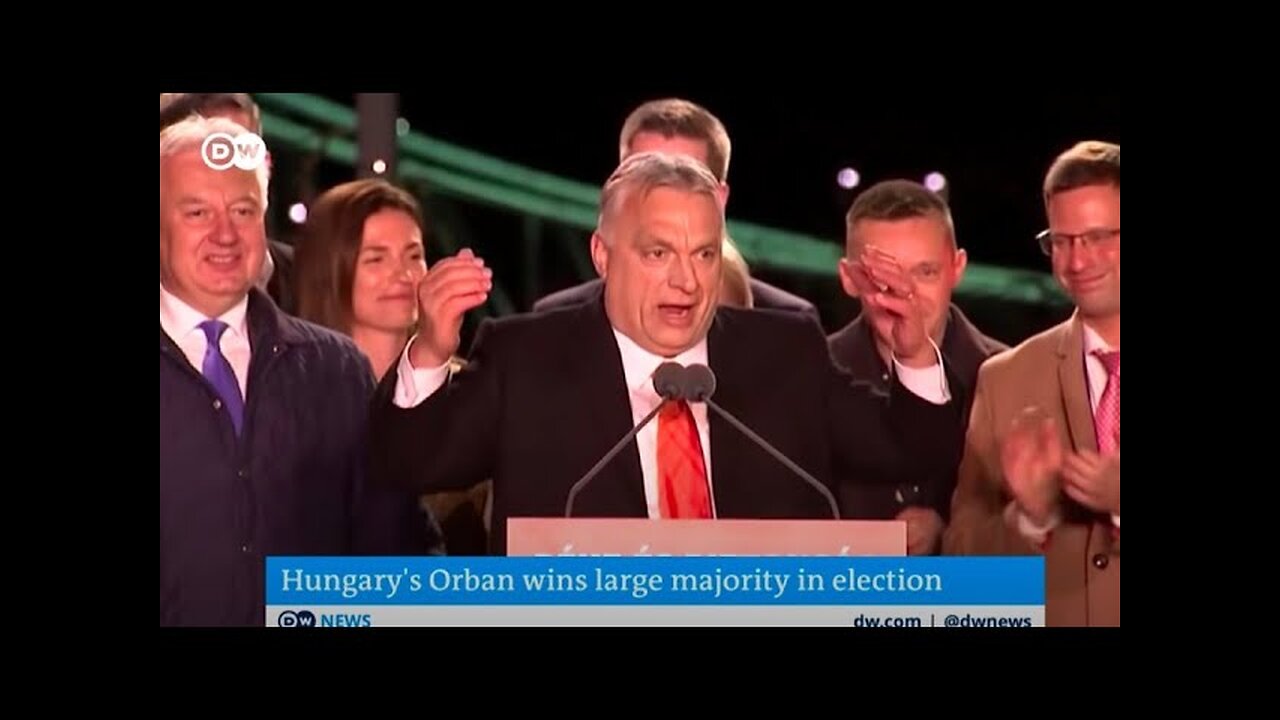Premium Only Content

Stefano Bottoni: Orban is a rebel with the consent of the authorities
TLDR: Orban's continued popularity in Hungary is rooted in cultural factors, lack of interest in liberal democracy, and support from the poor and uneducated, despite criticism abroad.
1. 00:00 📈 Orban's continued popularity in Hungary, despite criticism abroad, is rooted in cultural factors and a lack of interest in liberal democracy, with strong support from the poor and uneducated, as well as the rise of far-right movements.
1.1 Stefano Bottoni discusses why Orban is heavily criticized abroad for attacking liberal democracy, but still has the support of the Hungarian people.
1.2 Orban's popularity in Hungary is due to a lack of interest in liberal democracy and constitutional rules, with his appeal being rooted in cultural factors rather than traditional sources of legitimacy.
1.3 Orban has a strong support base, particularly among the poor and uneducated, with a record number of over three million people voting for him in the proportional part of the vote.
1.4 Orban's popularity in Budapest, despite opposition wins, reflects a high turnout of middle-class voters and the rise of far-right movements in Hungary.
2. 06:40 🔍 Orban's Fidesz party dominates wealthy and provincial areas in Hungary, with the opposition facing challenges in the electoral system, as analyzed by historian Stefano Bottoni.
3. 10:53 📰 Orban is a rebel with the consent of the authorities, ruling Hungary as he wants, despite social and regional inequality and low living standards for the poorest people.
3.1 The Hungarian opposition was not only defeated numerically in the election, but also realized they had no understanding of the local people's thoughts and society.
3.2 Orban is seen as anti-European, but Hungary is closely connected to Germany economically, making him a rebel with the consent of the authorities, allowing him to rule the country as he wants.
3.3 Hungary has been a major recipient of EU funds, but the distribution of the money has led to social and regional inequality.
3.4 Hungary has a history of social inequality, with certain groups such as farmers, pensioners, and the Roma community being valuable assets to the Fidesz party.
3.5 Orban provides some basic benefits to the poorest people, but social assistance and living standards remain at a very low level.
4. 18:49 📈 Orban's victory in Hungary is attributed to popular support for his energy and peace stance, as well as his policies benefiting various individuals, while the opposition failed to provide a viable alternative.
4.1 Orban won the election based on the promise of lower gas prices and staying out of the Russian-Ukrainian war, with the opposition being portrayed as war mongers.
4.2 Voters support Orban for policies like cheap loans for families and favorable family planning schemes.
4.3 Orban's grip on Hungarian society extends beyond electoral support, with various individuals benefiting from the system and voting for him for different reasons, including rational self-interest and a lack of belief in alternative options.
5. 27:56 🌍 Orban's increasing influence in Hungary and neighboring countries is changing regional power dynamics, with strong relationships built with conservative leaders and complex ties with Austria.
5.1 Hungary has influence in southeastern Europe and Orban's increasing strength within the country may be changing the regional power dynamics.
5.2 Orban became a regional influencer during the migration crisis of 2015-16, realizing that he had achieved everything in Hungarian politics and wanted to become a regional leader.
5.3 Orban has built strong relationships with conservative leaders in neighboring countries, consolidating power and influence in the region.
5.4 Romania and Slovakia have historical problems with Hungary, but Romania's NATO compatibility and deep state connections with Washington make it a bigger problem than Slovakia.
5.5 Orban has a complex and ambiguous relationship with Austrian elites, with Austria-Hungary viewing Hungary as a backward country, but Hungary sees Austria as an important asset in conflicts like the Ukrainian-Russian conflict, with both countries aligning with Germany in a similar way.
-
 1:04:12
1:04:12
PMG
1 day ago $2.79 earned"I’ll be DRONED for Christmas!"
11.8K2 -
 23:38
23:38
RealitySurvival
1 day agoBest Anti-Drone Rounds For Self Defense
8.08K2 -
 57:43
57:43
barstoolsports
14 hours agoBest Shot Wins The Game | Surviving Barstool S4 Ep. 7
199K9 -
 1:52:24
1:52:24
Kim Iversen
10 hours agoLuigi Mangione Charged With TERRORISM | Liz Cheney Accused Of WITNESS TAMPERING, Faces 20 YEARS IN JAIL
105K131 -
 6:50:10
6:50:10
Akademiks
11 hours agoJay Z says he aint NEVER been friends w/ DIDDY! Bhad Bhabie lost her man? Travis Hunter Down Bad?
110K13 -
 2:27:04
2:27:04
AirCondaTv Gaming
9 hours ago $23.47 earnedWar Thunder - Tankering Around for That 10 Bomb
56.1K5 -
 4:19:05
4:19:05
SpartakusLIVE
12 hours agoThe MACHINE locks in for 12-hour POWER stream
39.3K1 -
 1:58:40
1:58:40
Robert Gouveia
11 hours agoJ6 Coverup: Prosecute LIZ CHENEY; NY Judge REJECTS Immunity; Trump Breaks Gag?
172K77 -
 2:22:06
2:22:06
WeAreChange
10 hours agoPSYOP Spreads: Drones Shut Down Airport In New York!
106K50 -
 1:31:18
1:31:18
Redacted News
12 hours agoEMERGENCY! NATO AND CIA ASSASSINATE TOP RUSSIAN GENERAL, PUTIN VOWS IMMEDIATE RETALIATION | Redacted
248K455